42. Tiny Python 3.6 Notebook by Matt Harrison
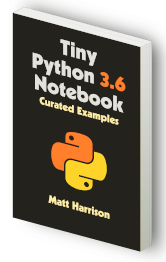 This is not an introduction to Python. Rather it is a notebook containing curated examples for Python 3 as well as the new features found in Python 3.6.
This is not an introduction to Python. Rather it is a notebook containing curated examples for Python 3 as well as the new features found in Python 3.6.
It is designed to accompany technical corporate training offered by the author or aid those who want a quick refresher to the Python syntax.
43. Building Skills in Object-Oriented Design by Steven F. Lott
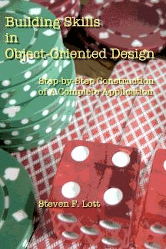 Building Skills in Object-Oriented Design teaches how to move from object-orientated programming to object-oriented design through a series of design exercises. This 285-page book has 46 chapters that will help you build OO design skills through the creation of a moderately complex family of application programs. This is a step-by-step guide to OO design and implementation.
Building Skills in Object-Oriented Design teaches how to move from object-orientated programming to object-oriented design through a series of design exercises. This 285-page book has 46 chapters that will help you build OO design skills through the creation of a moderately complex family of application programs. This is a step-by-step guide to OO design and implementation.
Build applications step-by-step with real-world sophistication. The code examples focus on the Python programming language. It uses casino table games (Roulette, Craps and Blackjack) as its context.
The purpose of this book is to build skills in object-oriented design prior to a project with fixed cost and deadline.
The book is licensed under a Creative Commons license.
44. Think Stats: Exploratory Data Analysis in Python by Allen B. Downey
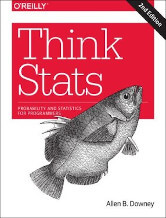
Think Stats is an introduction to Probability and Statistics for Python programmers. Most ideas are expressed using Python code.
Chapters examine:
- Exploratory data analysis.
- Distributions.
- Probability mass functions.
- Cumulative distribution functions.
- Modeling distributions.
- Probability density functions.
- Relationships between variables.
- Estimation.
- Hypothesis testing.
- Linear least squares.
- Regression.
- Time series analysis.
- Survival analysis.
- Analytic methods.
The book presents a case study using data from the National Institutes of Health and the National Survey of Family Growth and the Behavioral Risk Factor Surveillance System. Each chapter presents exercises to help develop a reader’s understanding.
Think Stats is published under the Creative Commons Attribution-NonCommercial 3.0 Unported License.
45. The Art and Craft of Programming: Python Edition by John C. Lusth
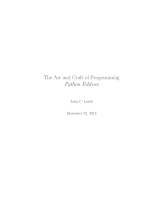 The Art and Craft of Programming: Python Edition is designed to be used as the primary textbook in a college-level first course in computing.
The Art and Craft of Programming: Python Edition is designed to be used as the primary textbook in a college-level first course in computing.
It takes a fairly traditional approach, emphasizing problem solving, design, and programming as the core skills of computer science. However, these ideas are illustrated using Python.
Although Python is used as the language, teaching Python is not the main point of this book. Rather, Python is used to illustrate fundamental principles of design and programming that apply in any language or computing environment. In some places, the author purposely avoids certain Python features and idioms that are not generally found in other languages. There are already many good books about Python on the market; this book is intended as an introduction to computing.
The author has confirmed the book is open source.
46. Fundamentals of Python Programming by Richard L. Halterman
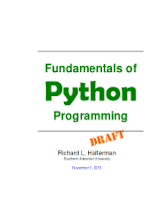
This book offers a veritable feast of information. Chapters cover:
- Values and Variables.
- Expressions and Arithmetic.
- Conditional Execution – Boolean expressions, the simple if statement, the if/else statement and more.
- Iteration – including nested and infinite loops, with iteration examples.
- Using Functions.
- Writing Functions.
- More on Functions.
- Objects.
- Lists.
- Tuples, Dictionaries, and Sets.
- Handling Exceptions.
- Custom Types.
- Class Design: Composition and Inheritance.
- Algorithm Quality.
- Representing Relationships with Graphs.
The book is published under an open-source compatible license.
47. Python 3 Module of the Week by Doug Hellmann
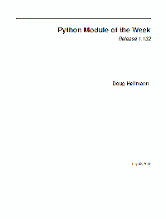 Python Module of the Week (PyMOTW) was started as a way to build the habit of writing something on a regular basis. The focus of the series is building a set of example code for the modules in the Python standard library.
Python Module of the Week (PyMOTW) was started as a way to build the habit of writing something on a regular basis. The focus of the series is building a set of example code for the modules in the Python standard library.
PyMOTW is a good source of documentation for Python modules.
PyMOTW includes a command line program, motw, to make it easier to access the examples while you are developing.
This work is made available under the terms of the Creative Commons Attribution-NonCommercial Share-alike 3.0 license.
48. Python for you and me by Kushal Das
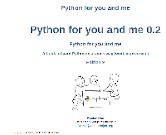 This book is designed for newcomers to the Python programming language.
This book is designed for newcomers to the Python programming language.
Topics covered include:
- Variables and Datatypes.
- Operators and expressions.
- Control flow.
- Looping.
- Data structures.
- Strings.
- Functions.
- File handling.
- Class.
- Modules.
- Collections module.
- Virtual Python Environment builder.
It’s released under the GNU Free Documentation License v1.2 or later.
Pages in this article:
Page 1 – Think Python and more books
Page 2 – Supporting Python 3 and more books
Page 3 – Invent Your Own Computer Games with Python and more books
Page 4 – Making Games with Python & Pygame and more books
Page 5 – Hacking Secret Ciphers with Python and more books
Page 6 – Learn Python, Break Python and more books
Page 7 – Modeling Creativity: Case Studies in Python and more books
Page 8 – Python in Hydrology and more books
Page 9 – Tiny Python 3.6 Notebook and more books
All books in this series:
| Free Programming Books | |
|---|---|
| Ada | ALGOL-like programming language, extended from Pascal and other languages |
| Agda | Dependently typed functional language based on intuitionistic Type Theory |
| Arduino | Inexpensive, flexible, open source microcontroller platform |
| Assembly | As close to writing machine code without writing in pure hexadecimal |
| Awk | Versatile language designed for pattern scanning and processing language |
| Bash | Shell and command language; popular both as a shell and a scripting language |
| BASIC | Beginner’s All-purpose Symbolic Instruction Code |
| C | General-purpose, procedural, portable, high-level language |
| C++ | General-purpose, portable, free-form, multi-paradigm language |
| C# | Combines the power and flexibility of C++ with the simplicity of Visual Basic |
| Clojure | Dialect of the Lisp programming language |
| ClojureScript | Compiler for Clojure that targets JavaScript |
| COBOL | Common Business-Oriented Language |
| CoffeeScript | Transcompiles into JavaScript inspired by Ruby, Python and Haskell |
| Coq | Dependently typed language similar to Agda, Idris, F* and others |
| Crystal | General-purpose, concurrent, multi-paradigm, object-oriented language |
| CSS | CSS (Cascading Style Sheets) specifies a web page’s appearance |
| D | General-purpose systems programming language with a C-like syntax |
| Dart | Client-optimized language for fast apps on multiple platforms |
| Dylan | Multi-paradigm language supporting functional and object-oriented coding |
| ECMAScript | Best known as the language embedded in web browsers |
| Eiffel | Object-oriented language designed by Bertrand Meyer |
| Elixir | Relatively new functional language running on the Erlang virtual machine |
| Erlang | General-purpose, concurrent, declarative, functional language |
| F# | Uses functional, imperative, and object-oriented programming methods |
| Factor | Dynamic stack-based programming language |
| Forth | Imperative stack-based programming language |
| Fortran | The first high-level language, using the first compiler |
| Go | Compiled, statically typed programming language |
| Groovy | Powerful, optionally typed and dynamic language |
| Haskell | Standardized, general-purpose, polymorphically, statically typed language |
| HTML | HyperText Markup Language |
| Icon | Wide variety of features for processing and presenting symbolic data |
| J | Array programming language based primarily on APL |
| Java | General-purpose, concurrent, class-based, object-oriented, high-level language |
| JavaScript | Interpreted, prototype-based, scripting language |
| Julia | High-level, high-performance language for technical computing |
| Kotlin | More modern version of Java |
| LabVIEW | Designed to enable domain experts to build power systems quickly |
| LaTeX | Professional document preparation system and document markup language |
| Lisp | Unique features - excellent to study programming constructs |
| Logo | Dialect of Lisp that features interactivity, modularity, extensibility |
| Lua | Designed as an embeddable scripting language |
| Markdown | Plain text formatting syntax designed to be easy-to-read and easy-to-write |
| Objective-C | Object-oriented language that adds Smalltalk-style messaging to C |
| OCaml | The main implementation of the Caml language |
| Pascal | Imperative and procedural language designed in the late 1960s |
| Perl | High-level, general-purpose, interpreted, scripting, dynamic language |
| PHP | PHP has been at the helm of the web for many years |
| PostScript | Interpreted, stack-based and Turing complete language |
| Prolog | A general purpose, declarative, logic programming language |
| PureScript | Small strongly, statically typed language compiling to JavaScript |
| Python | General-purpose, structured, powerful language |
| QML | Hierarchical declarative language for user interface layout - JSON-like syntax |
| R | De facto standard among statisticians and data analysts |
| Racket | General-purpose, object-oriented, multi-paradigm, functional language |
| Raku | Member of the Perl family of programming languages |
| Ruby | General purpose, scripting, structured, flexible, fully object-oriented language |
| Rust | Ideal for systems, embedded, and other performance critical code |
| Scala | Modern, object-functional, multi-paradigm, Java-based language |
| Scheme | A general-purpose, functional language descended from Lisp and Algol |
| Scratch | Visual programming language designed for 8-16 year-old children |
| SQL | Access and manipulate data held in a relational database management system |
| Standard ML | General-purpose functional language characterized as "Lisp with types" |
| Swift | Powerful and intuitive general-purpose programming language |
| Tcl | Dynamic language based on concepts of Lisp, C, and Unix shells |
| TeX | Markup and programming language - create professional quality typeset text |
| TypeScript | Strict syntactical superset of JavaScript adding optional static typing |
| Vala | Object-oriented language, syntactically similar to C# |
| VHDL | Hardware description language used in electronic design automation |
| VimL | Powerful scripting language of the Vim editor |
| XML | Rules for defining semantic tags describing structure ad meaning |
